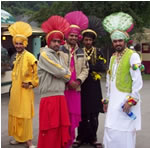Practising your language at international events

One way to practise using the language(s) you’re learning is to attend an international event such as the Llangollen International Musical Eisteddfod, which I went to this week. Such events attract participants and spectators from all over the world, so whatever language you’re learning, it’s likely that you’ll come across people who speak it and who will probably be happy to speak it with you.
While attending events as a spectator can be great fun, you might get even more opportunities to flex your linguistic muscles if you can become part of the team running the event. This might involve selling tickets or programmes, acting as a steward or usher, working in catering outlets, helping with electrical stuff such as sound and lighting, and many other possibilities. Any of these jobs could provide you with opportunities to speak your foreign language(s) and to meet people from various countries, and you’ll probably get to hear and see at least some of the performances for free.
If you’re hesitant about approaching strangers and attempting to speak their language, it helps if you have a few foreign phrases ready to go – things like, Hello. I’m learning your language. I really enjoyed your performance. That’s a wonderful / beautiful costume. Where are you from? What’s your name? Are you enjoying yourself? The weather is lovely / hot / cold / wet / terrible today, isn’t it. Is this your first visit to this event? If you’re really organised you could even put together a collection of phrases like this in some of the languages you’re likely to encounter. Even if you don’t speak much of a language, people are likely to be impressed if you have some phrases up your sleeve, especially for the languages few people study, such as Estonian, Latvian or Maltese.
